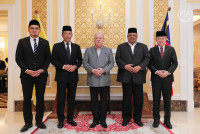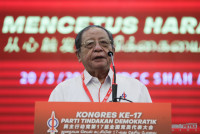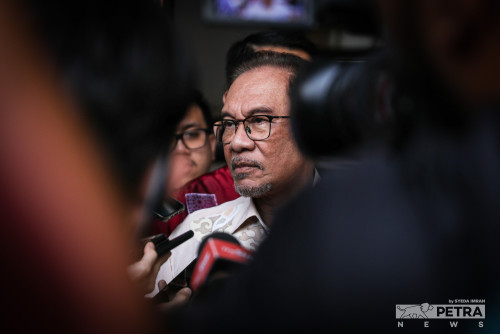THE recent remarks by Minister in the Prime Minister’s Department (Religious Affairs) Datuk Idris Ahmad calling on Muslims in the country not to attend the Bon Odori festival gives Malaysians an opportunity to reflect on the principle of the separation of religion from the state and politics.
To be clear, I think it is not a problem when religious leaders and their followers have discussions and debates on such matters concerning their faith. This happens in every religion and is part of the process of discovering one’s faith and the values it promotes.
I am of the view that every religion is free to debate and decide what is right or wrong for them in accordance with their beliefs and practices. Religious leaders of different faiths have the right to advise their followers on the do’s and don’ts pertaining to their religion.
The issue here is when these sorts of comments or instructions are made by a minister.
This becomes a problem for all Malaysians, because such views are seen as the official stand of the country and its people. Yet it does not represent the views or beliefs of the millions of Malaysians, who are of multi-ethnicity and multi-religious backgrounds.
The repercussions of such a statement or view are on the entire Malaysian population and not on a particular community or group. If Japan, for example, decides to pull out investments from Malaysia because of Idris’ statement, every Malaysian will be affected by this.
Such statements also cause disharmony between the followers of different cultures and religions in Malaysia when it is expressed and propagated by the government.
Article 3(1) of the federal constitution states that Islam is the religion of the federation and other religions may be practised in peace and harmony in any part of the federation.
The apex court, in a 1998 case decided by Lord President Tun Salleh Abbas, had stated that we are a secular state and the civil court administers secular law.
First prime minister Tunku Abdul Rahman, during his 80th birthday celebration organised by the Barisan Nasional in 1983, said: “The constitution must be respected and adhered to. There have been attempts by some people who tried to introduce religious laws and morality laws. This cannot be allowed.”
It has been a contention for many years now on whether Malaysia is an Islamic or a secular country. The latter it is, in my opinion. Perhaps it is now time for us to revisit the constitution and clearly word out the need to separate religion from the state.
The involvement of religion in shaping state policies has been an obstacle in Malaysia’s development and competitiveness on the global stage, and, in turn, has affected every taxpayer in this country.
Politicians have exploited religion for their own political survival and created disunity among the different cultures and religions in Malaysia. How much longer must we tolerate these politicians tearing apart our country?
This emphasises the need for our country to be governed by secular values that takes into account the rights and freedoms of every Malaysian, including the practice of all religions.
I am not advocating for the rights of Muslims to be curtailed in any way but merely seeking for the separation of religion from the state. A secular government will have no business in meddling in the administration of faith-related matters and secular values would be the cornerstone in deciding for policies, laws and even approvals for festivals such as the Bon Odori.
All religions and cultures in Malaysia can continue to be practised in peace and harmony. The statement by the Sultan of Selangor, Sultan Sharafuddin Idris Shah comes at the perfect moment as the religious affairs minister seemed to have overstepped his boundaries in instructing Muslims not to attend the Bon Odori festival.
Perhaps it is now time for us to also define clearly the power and authority of the various state sultan and the Yang di-Pertuan Agong in the administration of Islam in this country.
The various state-level constitutions already provide for the sultan as the head of the Islamic religion in their state. However, in reality, it is the federal government that seems to have a say and control over the administration of Islam, and this is where the interference of the state in religion occurs.
The recent statement by PAS Ulama Council and its women’s wing calling for Muslims to stay away from the Bon Odori festival despite the earlier rebuke by the Selangor sultan is a telling sign that the power of the sultans on religion is being challenged by the government.
PAS is part of the federal government and it is challenging the views of the head of Islam in Selangor. People are confused on who is the ultimate leader here.
The sultans must be in control of the Islamic institutions in the country and the state should never get involved in the administration of the religion. This will also make redundant the need for a religious affairs minister.
All matters pertaining to Islam should come directly under the purview and responsibility of the respective sultans, who will be assisted by their personals and state committees without government or political interference.
PAS ideologies are a matter of great concern for Malaysians as it is a part of the federal government and can influence policies and laws. From its opposition to the Beer Fest Carnival, Valentine’s Day, the Bon Odori festival, and PAS leader Tan Sri Abdul Hadi Awang sympathising with the Taliban regime, PAS has continuously created controversies and caused unnecessary distress to Malaysians, often encroaching into the rights of non-Muslims.
It is time we call for a ban on political parties using religion as their sole ideology. History has shown how religion can be exploited by political parties and leaders to cause unrest and divisions among communities and disrupt the development of a country.
The nexus of state and religion in this country overlaps to the extent that Perlis Mufti Datuk Mohd Asri Zainul Abidin is not aware that he has no right or business in telling people of other faiths on how to celebrate their festivals.
It was recently reported that he had proposed for the Bon Odori festival to be renamed to “Japanese cultural festival” and for the organiser to ensure that there will be no religious elements at the event.
It is mind-boggling on how a well-known preacher could come out with such a statement. While many might laugh at his statement and joke on how silly that can be, incidents such as this, reaffirms the need for the separation of religion from the state and politics. – The Vibes, June 11, 2022
K. Sudhagaran Stanley is a human rights activist



















